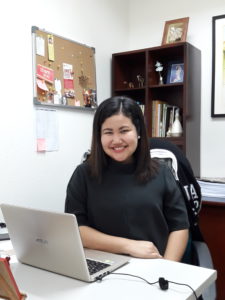 It has been three years since the Six-Year Integrated University Program, widely known as “6YP,” was launched. The first two years of the program, called junior college (JC), is the equivalent of senior high school. No longer high school students but not yet in college, the second youngest group of people in UA&P seem to be at the crossroads. How are they faring so far in a university setting?
It has been three years since the Six-Year Integrated University Program, widely known as “6YP,” was launched. The first two years of the program, called junior college (JC), is the equivalent of senior high school. No longer high school students but not yet in college, the second youngest group of people in UA&P seem to be at the crossroads. How are they faring so far in a university setting?
We’ll hear it from the program director of junior college, Ms. Margeaux Marie R. Valdez. “Ms. Mags,” as her wards call her, is no stranger to teaching young people. Her background in Early Childhood Education afforded her stints here and abroad as pre-school teacher. After acquiring a master’s degree from the University of Queensland, she came home in 2016 and taught in a technical-vocational school for young women. Six months later, at the age of 31, she had to apply what she learned from Australia on adolescent development, students at risk, guidance and counseling, educational leadership, and behavior management as then deputy program director of UA&P’s Junior College program, which is under the wings of the College of Arts and Sciences (CAS).
Learn a thing or two about the youth amongst us from a young adult herself.
How was your first month on the job?
The first month was really exciting because I was introduced to what the program is, and then I had to handle things that were left from the previous school year, which was mostly focused on remedials. I had to figure out how to do it. I had to meet with the students who were lagging behind and meet with their parents too. I was busy reading up on a lot of things about the program, about K to 12, and how things go from there. It was also my first time to be exposed to the different units of the University and to the faculty and staff. Everything was new.
What do you do now as program director?
I ensure that we comply with the Department of Education’s curriculum for the senior high school. I also collaborate with the different department chairs in CAS as well as with the faculty of the junior college program. We plan the professional development of teachers. I also work with them on faculty evaluation. Another task is the daily running of the program. I deal with students who have special concerns. If parents would like to talk with me to raise certain concerns, I also manage that. I am also working on developing the program further, improving it, and thinking of ways of making the program more beneficial to the students. I collaborate with the Center for Student Affairs (CSA) for behavior concerns and career guidance. I think my main job is to manage expectations among students, teachers, faculty, and parents.
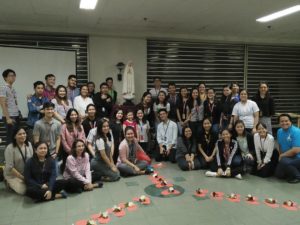
Who are the people working with you?
During my first year, Ms. Miles helped me out, but she also worked for the CAS Operations Committee, so it was very challenging. The second year was better because she worked full time with me. Now we have Ms. WingWing Mendoza, who is the faculty assistant for the program. She handles students’ and parents’ concerns, and talks to the teachers too in case there are problem students. Dr. Judy Tanael helps us in the curriculum.
Describe the junior college students.
First and foremost, they are very energetic, and that’s a very good quality. They’re interested in learning a lot of things. They’re excited to experience everything on campus, so they have a myriad of extra-curricular activities. Second, they’re also open-minded. They just soak up whatever they learn, and they appreciate whatever they’ve learned. Generally, I think they’re a good bunch. I’d like to think that there’s a high potential and promise.
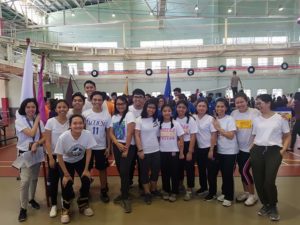
What perceptions and biases of yours on young people were challenged when you handled the junior college?
It was during my first month when I realized that working with teenagers can be very challenging because the teenage years are a crucial period. There’s much pressure on the young people, numerous expectations that they have to meet. So, they tend to do certain things that are not ideal. I thought young people don’t lie. That they’re honest and responsible. When I experienced the opposite firsthand, I realized that I have to learn how to balance, to understand where they’re really coming from, to contextualize the action. While we do want to trust them and take them at their word, at the end of the day, we still need to provide them with guidance and support because they are dealing with a lot of issues.
What was reaffirmed when I started dealing with them was that with the right support and information, they will bloom. This is the best time to mold them, to form them. At the same time, it’s also a tricky time. We, as adults, need to attend to them the best way possible, in all aspects. That’s moral, spiritual, emotional, etc. We try to provide for all of those areas as best we can.
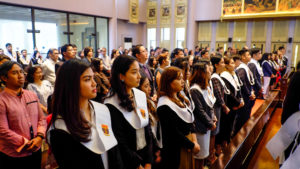
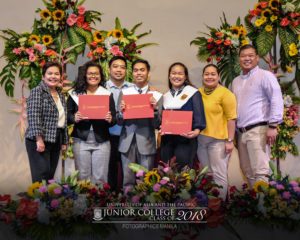
What do they like to do, spend time on, or believe in?
Although they may complain that they find school so stressful, I still think that they do like to learn. They love to learn about new things, about ideas. I think that’s mainly because of social media. With the Internet, they have access to all information and are able to know a lot of things. The downside is that sometimes they are misinformed, or the media that they’re exposed to may not necessarily be telling the truth. So the challenge lies in developing in them that sense of critical thinking.
They love creativity, things that have to do with the arts. They join the college orgs and have many extra-curricular activities. Some assume leadership posts. They also like to travel and experience new places. They also have sports and are members of varsities. In fact, when we had our recognition ceremony, we honored also those students for their achievements in extra-curricular activities last year.
During my Personal Development class, I asked them what topics they want to talk about. What came up was mostly how to manage stress. They’re learning how to manage depression, anxiety, and such disorders. Then boy-girl relationships too. Another interest is service. That’s based on what they experienced last year when we had the Christmas outreach at Barangay Caniogan. That was an initiative of the students, and quite a lot volunteered.
What are you most excited about with the junior college program?
Number 1 is to see how these students will do in college. Are they prepared for college because of the junior college program? I’m excited about meeting the new students and challenging them to meet the requirements of the program. I’m excited to run again the Theology of the Body and the Personal Development class.
What projects do they have at the present?
[As of time of writing] I’m working closely with the block reps of the Grade 12 so that we can have an outreach for the Lenten season. For the Theology of the Body (TOB) for Grade 12, as a final output, we’re requiring them to make a film to promote the teachings of TOB.
A project in the pipeline, you can say, is developing the program further. We’ve proposed the Junior College Development Program. Under that is Theology of the Body for the second semester of Year 2 (Grade 12), and Career Pathways for the second semester for Year 1 (Grade 11). ‘Yung first semester, wala pa kaming activity for that. So I’m hoping to work with Mr. Floyd Batongbakal (CSA) in partnership with the Guidance Office to develop a program that will better address the needs of the junior college, to make it separate from the Freshmen Development Program because the junior college students are in a different developmental stage. They have a different mindset. We’re hoping to develop that program together with CSA.
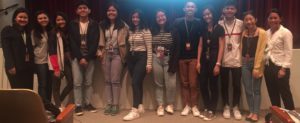
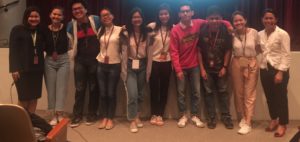 Block representatives
Block representatives
What are the highs and lows?
A high definitely is meeting the students and getting to know them individually. It’s very inspiring to see their energy, their enthusiasm. Another one is to teach in class. I can’t see myself being detached from teaching because I’m an educator by heart; it’s really what I love to do. It’s a good way also to be in touch with the issues of the students. It would be hard to manage the program if you’re not aware of what they’re going through, what their interests are, how they are. The JC graduates, who are now in college, assume roles. They’re very active in the University, in their organizations. They love the school. It’s a high for me to see them improve.
For the lows, it would have to be not having enough time to do all the things that we want to do for the program. Maybe it would be better if I had more staff to help me run and grow the program and teach. Also, since we’re still figuring things out at this point, systems aren’t in place yet. So, there’s work that needs to be done in terms of developing the systems. I also haven’t had the opportunity to meet all the faculty because of lack of time and exposure to them.
What did you discover about yourself because of the junior college?
I didn’t realize that I’d enjoy teaching in junior college as much as I do because my background is preschool. I love teaching little children because they’re so adorable. In junior college, the approach is different. I discovered that I am also learning side by side with them. I enjoy teaching the JC students because they have so much potential and you can really change them, form them, and influence them for the good. It’s tiring, it’s demanding, but it’s worth it. #
Leave a Reply